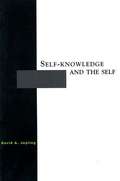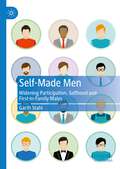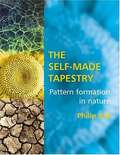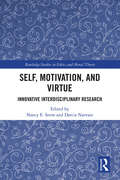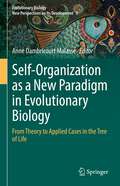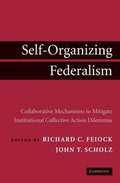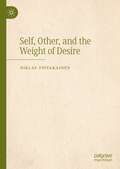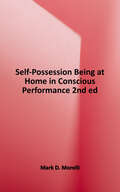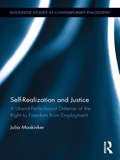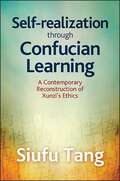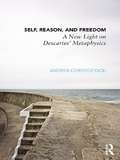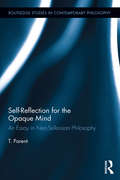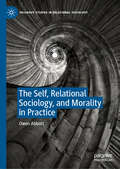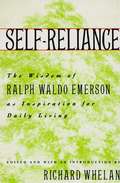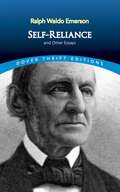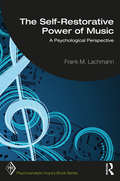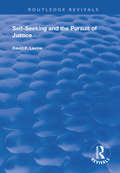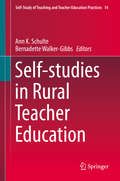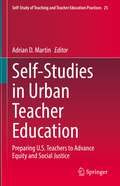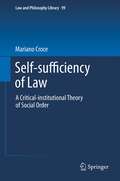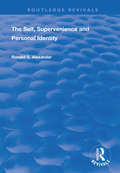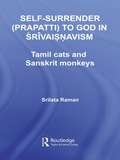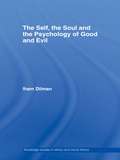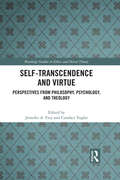- Table View
- List View
Self-Knowledge and the Self
by David A JoplingIn this clear and reasoned discussion of self- knowledge and the self, the author asks whether it is really possible to know ourselves as we really are. He illuminates issues about the nature of self-identity which are of fundamental importance in moral psychology, epistemology and literary criticism. Jopling focuses on the accounts of Stuart Hampshire, Jean-Paul Sartre and Richard Rorty, and dialogical philosophical psychology and illustrates his argument with examples from literature, drama and psychology.
Self-Made Men: Widening Participation, Selfhood and First-in-Family Males
by Garth StahlThis book explores how boys from low-socioeconomic status backgrounds disengage from their education, and are resultantly severely underrepresented in post-compulsory education. For those who attend university, many will be first-in-their-family. As first-in-family students, they may encounter significant barriers which may limit their participation in university life and their acquisition of social and cultural capital. Drawing on a longitudinal study of young Australian men pursuing higher education, the book provides the first detailed account of socially mobile working-class masculinities. Investigating the experiences of these young men, this book analyses their acclimatisation to new learning environments as well as their changing subjectivities. The monograph draws on various sociological theories to analyse empirical data and make practical recommendations which will drive innovation in widening participation initiatives internationally. This book will be of interest to scholars interested in widening participation, transitions, social mobility and Critical Studies of Men and Masculinities.
The Self-made Tapestry: Pattern Formation in Nature
by Philip BallA revelatory exploration of nature's magnificent patterns and forms--and of their origins in simple physical law.
Self, Motivation, and Virtue: Innovative Interdisciplinary Research (Routledge Studies in Ethics and Moral Theory)
by Nancy E. Snow Darcia NarvaezThis volume features new findings by nine interdisciplinary teams of researchers on the topics of self, motivation, and virtue. Nine chapters bringing together scholars from the fields of philosophy, psychology, neuroscience, and sociology advance our substantive understanding of these important topics, and showcase a variety of research methods of interdisciplinary interest. Essays on Buddhism and the self in the context of romantic relationships, the development of personal projects and virtue, the notion of self-distancing and its moral impact, virtues as self-integrated traits, humility and the self in loving encounter, the importance of nation and faith in motivating virtue in western and non-western countries, roles for the self and virtue in eudaimonic growth, overcoming spiritual violence and sacramental shame in Christian communities, and an investigation into the moral self highlight the range and diversity of topics explored in this volume. The concept of deep integration also characterizes this work: each member of the interdisciplinary teams was fully and equally invested in their project from inception to completion. This approach invites teams to examine their disciplinary assumptions, rethink familiar concepts, and adjust methodologies in order to view their topics with fresh eyes. The result is not only new findings of substantive and methodological interest, but also an interesting glimpse into the thinking of the researchers as they sought interdisciplinary common ground in their research. Self, Motivation, and Virtue will be of interest to scholars in philosophy, moral psychology, neuroscience, and sociology who are working on these topics.
Self-Organization as a New Paradigm in Evolutionary Biology: From Theory to Applied Cases in the Tree of Life (Evolutionary Biology – New Perspectives on Its Development #5)
by Anne Dambricourt MalasséThe epistemological synthesis of the various theories of evolution, since the first formulation in 1802 with the transmission of the inherited characters by J.B. Lamarck, shows the need for an alternative synthesis to that of Princeton (1947). This new synthesis integrates the scientific models of self-organization developed during the second half of the 20th century based on the laws of physics, thermodynamics, and mathematics with the emergent evolutionary problematics such as self-organized memory.This book shows, how self-organization is integrated in modern evolutionary biology. It is divided in two parts: The first part pays attention to the modern observations in paleontology and biology, which include major theoreticians of the self-organization (d’Arcy Thompson, Henri Bergson, René Thom, Ilya Prigogine). The second part presents different emergent evolutionary models including the sciences of complexity, the non-linear dynamical systems, fractals, attractors, epigenesis, systemics, and mesology with different examples of the sciences of complexity and self-organization as observed in the human lineage, from both internal (embryogenesis-morphogenesis) and external (mesology) viewpoints.
Self-Organized Criticality
by Henrik Jeldtoft JensenSelf-organized criticality (SOC) is based upon the idea that complex behavior can develop spontaneously in certain multi-body systems whose dynamics vary abruptly. This book is a clear and concise introduction to the field of self-organized criticality, and contains an overview of the main research results. The author begins with an examination of what is meant by SOC, and the systems in which it can occur. He then presents and analyzes computer models to describe a number of systems, and he explains the different mathematical formalisms developed to understand SOC. The final chapter assesses the impact of this field of study, and highlights some key areas of new research. The author assumes no previous knowledge of the field, and the book contains several exercises. It will be ideal as a textbook for graduate students taking physics, engineering, or mathematical biology courses in nonlinear science or complexity.
Self-Organizing Federalism: Collaborative Mechanisms to Mitigate Institutional Collective Action Dilemmas
by Richard C. Feiock John T. ScholzThis book investigates the self-organizing responses of governments and interests to the institutional collective action (ICA) dilemmas of particular concern to students of federalism, urban governance, and regional management of natural resources. ICA dilemmas arise in fragmented systems whenever decisions by one independent formal authority do not consider costs or benefits imposed on others. The ICA framework analyzes networks, joint projects, partnerships, and other mechanisms developed by affected parties to mitigate ICA decision externalities. These mechanisms play a widespread but little-understood role in federalist systems by reshaping incentives in order to encourage coordination/cooperation. The empirical studies of urban service delivery and regional integration of regional resource management address three questions: How does a given mechanism mitigate costs of uncoordinated decisions? What incentives do potential members have to create the mechanism? How do incentives induced by the mitigating mechanism affect its sustainability in a changing environment and its adaptability to other ICA dilemmas?
Self, Other, and the Weight of Desire
by Niklas ToivakainenThis is a book about the moral-existential nature of, and the desire inscribed in, the deadlocks generated by our attempts to ground and exhaustively explain the concerns that provoke philosophical reflection.While the book argues that these deadlocks are symptomatic of an impossibility internal to the very enterprise of grounding and explanation, it does not, however, declare any substantial groundlessness. Rather, the book shows that the choice between secure ground and groundlessness, or between final explanations and the inexplicable, is ultimately arbitrary. Instead, through readings of the so-called hard problem of consciousness, of Descartes’ first principle of philosophy, of Plato’s dialogue Gorgias, and of Lacan and Wittgenstein, Toivakainen argues that the actual point of significance, the sense of the impossibility or deadlock, must be traced back to the claims of desire that inform the very movement of grounding and explanation, a desire that is inscribed in a constitutive and inescapable address between self and other. In short, the book translates and rewrites points of structural deadlock into their (original) moral-existential landscapes by following traces of desire.
Self-possession: Being at Home in Conscious Performance
by Mark D. MorelliThis book is a meditative exploration of our inescapable and fluid relationship to the fundamental ideals of Meaning, Objectivity, Knowledge, Truth, Reality, and Value upon which we depend to inform and guide our living. It is an attempt to describe the elusive interior experience of these basic notions at work in our conscious performance. It is inspired by the work of Bernard Lonergan, but it is not an account of his ideas. It is an independent exercise in taking possession of oneself as a seeker of meaning and value. “It is as if music and color is washing over the rather austere architecture of INSIGHT, allowing it to do its real work in the life of the reader.” TOM COSGROVE, PROF. OF CIVIL ENGINEERING, U. OF LIMERICK “This book is remarkable in many ways: it is accessible and profound, humorous in a tongue-in-cheek kind of way and serious, very interesting to read in such a way that it is hard to put down, and very fundamental in confronting basic issues of human thinking and living ...” JAMES MARSH, PROFESSOR EMERITUS, PHILOSOPHY, FORDHAM U. "I could not recommend the book more highly. It is an important book." RICHARD LIDDY, SETON HALL U. "This is exactly what the doctor ordered. My thinking is that Catholic universities need to develop a core curriculum of philosophy courses that teach self-appropriation and also link self-appropriation to the skills for discerning the religious or mystical dimension of their own conscious experiences. [Self-Possession] does the former beautifully and provides a splendid intro into the second." Kenneth Melchin, Professor of Theology, St. Paul University. "Morelli's meditations are just the opposite of logic puzzles and trolley problems. [They] are existential lures into the philosophical act itself." Thomas Jeannot, Gonzaga University.
Self-Realization and Justice: A Liberal-Perfectionist Defense of the Right to Freedom from Employment (Routledge Studies in Contemporary Philosophy)
by Julia MaskivkerIn this book, Maskivker argues that there ought to be a right not to participate in the paid economy in a new way; not by appealing to notions of fairness to competing conceptions of the good, but rather to a contentious (but defensible) normative ideal, namely, self-realization. In so doing, she joins a venerable tradition in ethical thought, initiated by Aristotle and developed in the work of important eighteenth and nineteenth century thinkers including Smith, Hume, and Marx.The book engages on-going debates (in both philosophical and real world political and social policy circles) about the provision of basic income grants, necessary to make the possibility of self-realization real for all. Traditional defenses of unconditional welfare benefits emphasize ideals of state neutrality when they claim that society should not discriminate against preferences for leisure in favor of preferences for work. According to these views, the state ought not to interfere with people’s choices about what constitutes the "good life." In contradistinction, Maskivker offers an innovative argument in defense of a particular ideal of the "good life," namely, life-goals directed at the pursuit of self-realization. However, her understanding of self-realization appeals to modern and contemporary values of freedom and pluralism. In a refreshingly new light, the book strikes a balance between fascinating debates on the conditions of human flourishing on the one hand, and heated discussions about the Welfare State on the other.
Self-Realization through Confucian Learning: A Contemporary Reconstruction of Xunzi's Ethics (SUNY series in Chinese Philosophy and Culture)
by Siufu TangSelf-Realization through Confucian Learning reconstructs Confucian thinker Xunzi's moral philosophy in response to the modern focus on self-realization. Xunzi (born around 310 BCE) claims that human xing ("nature" or "native conditions") is without an ethical framework and has a tendency to dominate, leading to bad judgments and bad behavior. Confucian ritual propriety (li) is needed to transform these human native conditions. Through li, people become self-directing: in control of feelings and desires and in command of their own lives. Siufu Tang explicates Xunzi's understanding of the hierarchical structure of human agency to articulate why and how li is essential to self-realization. Ritual propriety also structures relationships to make a harmonious communal life possible. Tang's focus on self-realization highlights how Confucianism can address the individual as well as the communal and serve as a philosophy for contemporary times.
Self, Reason, and Freedom: A New Light on Descartes' Metaphysics
by Andrea ChristofidouFreedom and its internal relation to reason is fundamental to Descartes’ philosophy in general, and to his Meditations on First Philosophy in particular. Without freedom his entire enquiry would not get off the ground, and without understanding the rôle of freedom in his work, we could not understand what motivates key parts of his metaphysics. Yet, not only is freedom a relatively overlooked element, but its internal relation to reason has gone unnoticed by most studies of his philosophy. Self, Reason, and Freedom: A New Light on Descartes’ Metaphysics, by defending freedom’s internal relation to reason, sheds new light on Descartes’ metaphysics and restores the often dismissed Fourth Meditation to the core of his metaphysics as he conceived it. Implicit in that relation is a rejection of any authority external to reason. Andrea Christofidou shows how this lends strength and explanatory force to Descartes’ enquiry, and reveals his conception of the unity of the self and of its place in the world. Self, Reason, and Freedom: A New Light on Descartes’ Metaphysics is essential reading for students and scholars of Descartes and anyone studying seventeenth-century philosophy.
Self-Reflection for the Opaque Mind: An Essay in Neo-Sellarsian Philosophy (Routledge Studies in Contemporary Philosophy)
by T. ParentThis volume attempts to solve a grave problem about critical self-reflection. The worry is that we critical thinkers are all in "epistemic bad faith" in light of what psychology tells us. After all, the research shows not merely that we are bad at detecting "ego-threatening" thoughts à la Freud. It also indicates that we are ignorant of even our ordinary thoughts—e.g., reasons for our moral judgments of others (Haidt 2001), and even mundane reasons for buying one pair of stockings over another! (Nisbett & Wilson 1977) However, reflection on one’s thoughts requires knowing what those thoughts are in the first place. So if ignorance is the norm, why attempt self-reflection? The activity would just display naivety about psychology. Yet while respecting all the data, this book argues that, remarkably, we are sometimes infallible in our self-discerning judgments. Even so, infallibility does not imply indubitability, and there is no Cartesian ambition to provide a "foundation" for empirical knowledge. The point is rather to explain how self-reflection as a rational activity is possible.
The Self, Relational Sociology, and Morality in Practice (Palgrave Studies in Relational Sociology)
by Owen AbbottProviding a theory of moral practice for a contemporary sociological audience, Owen Abbott shows that morality is a relational practice achieved by people in their everyday lives. He moves beyond old dualisms—society versus the individual, social structure versus agency, body versus mind—to offer a sociologically rigorous and coherent theory of the relational constitution of the self and moral practice, which is both shared and yet enacted from an individualized perspective. In so doing, The Self, Relational Sociology, and Morality in Practice not only offers an urgently needed account of moral practice and its integral role in the emergence of the self, but also examines morality itself within and through social relations and practices. Abbott’s conclusions will be of interest to social scientists and philosophers of morality, those working with pragmatic and interactionist approaches, and those involved with relational sociology and social theory.
Self-Reliance: The Wisdom of Ralph Waldo Emerson as Inspiration for Daily Living
by Richard WhelanA finely honed abridgement of Emerson's principal essays with an introduction that clarifies the essence of Emerson's ideas and establishes their relevance to our own troubled era. This is the first truly accessible edition of Emerson's work, revealing him to be one of America's wisest teachers.
Self-Reliance and Other Essays (Dover Thrift Editions)
by Ralph Waldo EmersonEssayist, poet, and philosopher, Ralph Waldo Emerson (1803–1882) propounded a transcendental idealism emphasizing self-reliance, self-culture, and individual expression. The six essays and one address included in this volume, selected from Essays, First Series (1841) and Essays, Second Series (1844), offer a representative sampling of his views outlining that moral idealism as well as a hint of the later skepticism that colored his thought. In addition to the celebrated title essay, the others included here are "History," "Friendship," "The Over-Soul," "The Poet," and "Experience," plus the well-known and frequently read Harvard Divinity School Address.
The Self-Restorative Power of Music: A Psychological Perspective (Psychoanalytic Inquiry Book Series)
by Frank M. LachmannThis book explores how we can understand the place of music from a self psychological perspective, by investigating three journeys: the one we take when listening to music, the literal journey of the author from Nazi Germany to the United States, and the subjective round-trip between the past and the present. Drawing on the work of Heinz Kohut, the author examines how music can provide us with a way to reconnect with a sense of self, and how this can manifest in psychological and physical ways. There is particular reference to the work of Richard Wagner, Cole Porter, and Richard Strauss, and an examination of how their music enabled them, in times of stress and crisis, to restore and maintain a more positive sense of self. Finally, the book looks back at the author’s own experiences of music and the place of music in the Jewish world. With clinical excerpts, personal narrative, and sophisticated psychoanalytic insights, this book will appeal to all psychoanalysts wanting to understand the place of music in shaping the psyche, as well as music scholars wishing to gain a deeper appreciation of the psychology of music.
Self-Seeking and the Pursuit of Justice (Routledge Revivals)
by David P. LevineFirst published in 1997, this volume delves into the most influential theories of economic justice, which ground themselves in utilitarian or related contractarian ideas about the self. These ideas take self-interest to be transparent and unproblematic. Favoured assumptions about the self also make scarcity the primary reality with which economic justice must deal. Much is lost in consideration of the justness of economic arrangements when we take the wants and interests of the self for granted in this way, and treat scarcity as a premise. In this book the author places the discussion of economic justice on a sounder foundation as regards the nature and ends of the self. The book begins with a discussion of the self as a structure, and proceeds to consider aspects of self-interest, public ends, economic welfare, needs and wants, the limits of the market, economic democracy, global inequality, and justice as the end of development.
Self-studies in Rural Teacher Education
by Ann K. Schulte Bernadette Walker-GibbsThe purpose of this book is to highlight the work of teacher educators in the field of rural education. In this book, education faculty who work in teacher education study the ways in which one's identity impacts one's teaching and the partnerships with rural schools. Although the field of research on teacher preparation has an abundance of studies on preparing students for the challenges of urban settings, there is much less emphasis on rural education, despite the prevalence of rural schools. This book problematises notions of rural or rurality which is often considered via a deficit or a generalised model where a stereotype of one kind of rural is outlined. Developing more multi-faceted understandings of rurality is a key to attracting and retaining teachers who understand the complexities and opportunities of living and working in rural spaces.
Self-Studies in Urban Teacher Education: Preparing U.S. Teachers to Advance Equity and Social Justice (Self-Study of Teaching and Teacher Education Practices #25)
by Adrian D. MartinThis book critically explores pedagogical activities, policies, and coursework that teacher education programs can provide to more fully prepare teacher candidates and in-service educators for professional practice in urban schools. It illustrates how teacher educators from across the United States are supporting teacher candidates and in-service teachers to possess the knowledge, skills, and dispositions for equity-oriented instructional practices and advocacy for professional engagement in the urban context. Chapters share insider perspectives of urban teacher education on preparing teachers to teach in culturally, linguistically, and socio-economically diverse classrooms. They discuss teacher educators’ learning about their own practice in the preparation of teachers for city schools, preparing teacher candidates from rural and suburban contexts to teach in urban settings, and supervising practicing teachers in city classrooms. The volume also focuses on the interplay of cultural and linguistic parity between teacher educators and their preservice/in-service teacher students, implementing learning activities or coursework about teaching in urban schools, and enacting critical pedagogical practices. This book will be beneficial to teacher educators focused on teacher preparation for city classrooms and urban school districts, and researchers seeking to adopt self-study methodology in their own research endeavors.
Self-sufficiency of Law
by Mariano CroceThe book investigates the role of law and legal experts in the organisational dynamics of a population, demonstrating that law is a stable practice among those who (in virtue of the special knowledge they master) are called upon to select the 'normative facts' of a population, i.e. the interactional standards that are proclaimed as binding for the entire population by the publicly recognised legal experts (whose peremptory judgments can be only revised by peers). It proposes an integration of the recent research outcomes achieved in three different areas of study: legal positivism, legal institutionalism and legal pluralism and examines the notions of rule, coercion, institution, practice elaborated by significant theorists in the mentioned areas and illumine both their merits and flaws. Furthermore it advances a notion of law and a description of the legal field which are able to account for the nature of the legal filed as the cradle of the social order. new back cover copy: In an era characterized by a streaking global pluralism, the collapse of many state agencies, the emergence of multiple sources of law, and the rise of informal justice, the idea of a unitary and homogenous legal system seems old-fashioned. But philosophers, sociologists and anthropologists still hold many debates on the nature of law and its function, which is that law represents an institution that characterizes any orderly social context of human beings, and this book plunges into the center of those debates. Self-sufficiency of Law: A Critical-institutional Theory of Social Order investigates the role of law and legal experts in the organizational dynamics of a population. It demonstrates that law is a stable practice among those who are called upon to select the "normative facts" of a population, that is, the interactional standards that are proclaimed as binding for the entire population by the publicly recognized legal experts. To do this, the author proposes an integration of the recent research outcomes achieved in three different areas of study--legal positivism, legal institutionalism and legal pluralism. He examines the notions of rule, coercion, institution and practice elaborated on by significant theorists in these fields, highlighting both the merits and flaws and ultimately advancing a notion of law and a description of the legal field which are able to account for the nature of the legal field as the cradle of social order. This text covers key guidelines for empirical research and political activities in Western and non-Western countries.
The Self, Supervenience and Personal Identity (Routledge Revivals)
by Roland G. AlexanderFirst published in 1997, this volume addresses the issue of personal identity by examining the possibility that a person is ascribed identity on the basis of having a supervenient self. Ronald G. Alexander uses the methods of non-eidetic phenomenology and analytic ontology to argue that the self is supervenient on the physical and psychological properties of the human being. Understood through the manner Alexander advocates, the self is not a statis entity, but reflects the temporal nature of the person. Alexander argues that the self is the ‘pattern’, ‘character’, or ‘narrative identity’ that is the outcome of a person’s decision-making and actions.
Self-Surrender: Tamil Cats or Sanskrit Monkeys? (Routledge Hindu Studies Series)
by Srilata RamanFilling the most glaring gap in Shrivaishnava scholarship, this book deals with the history of interpretation of a theological concept of self-surrender-prapatti in late twelfth and thirteenth century religious texts of the Shrivaishnava community of South India. This original study shows that medieval sectarian formation in its theological dimension is a fluid and ambivalent enterprise, where conflict and differentiation are presaged on "sharing", whether of a common canon, saint or rituals or two languages (Tamil and Sanskrit), or of a "meta-social" arena such as the temple. Srilata Mueller, a member of the Shrivaishnava community, argues that the core ideas of prapatti in these religious texts reveal the description of a heterogeneous theological concept. Demonstrating that this concept is theologically moulded by the emergence of new literary genres, Mueller puts forward the idea that this original understanding of prapatti is a major contributory cause to the emergence of sectarian divisions among the Shrivaishnavas, which lead to the formation of two sub-sects, the Tenkalai and the Vatakalia, who stand respectively, for the "cat" and "monkey" theological positions. Making an important contribution to contemporary Indian and Hindu thinking on religion, this text provides a new intellectual history of medieval Indian religion. It will be of particular interest to scholars of Shrivaishnava and also Hindu and Indian religious studies.
The Self, the Soul and the Psychology of Good and Evil (Routledge Studies in Ethics and Moral Theory)
by Ilham DilmanThe way an individual's psychology is intertwined with their morality is the subject of this fascinating book from the pen of the late Ilham Dilman.Dilman convincingly argues that evil, though it cannot be reduced to psychological terms (it is a moral concept) is explicable in terms of an individual person's psychology. Goodness, by contrast, comes from the person and not their psychology.Philosophers the world over will want to read this book and see how Dilman skilfully defends his arguments.
Self-Transcendence and Virtue: Perspectives from Philosophy, Psychology, and Theology (Routledge Studies in Ethics and Moral Theory)
by Jennifer A. Frey Candace VoglerRecent research in the humanities and social sciences suggests that individuals who understand themselves as belonging to something greater than the self—a family, community, or religious or spiritual group—often feel happier, have a deeper sense of purpose or meaning in their lives, and have overall better life outcomes than those who do not. Some positive and personality psychologists have labeled this location of the self within a broader perspective "self-transcendence." This book presents and integrates new, interdisciplinary research into virtue, happiness, and the meaning of life by re-orienting these discussions around the concept of self-transcendence. The essays are organized around three broad themes connected to self-transcendence. First, they investigate how self-transcendence helps us to understand aspects of the moral life as it is studied within psychology, including the development of wisdom, the practice of moral praise, and psychological well-being. Second, they explore how self-transcendence is linked to virtue in different religious and spiritual traditions including Judaism, Islam, Christianity, Buddhism, and Confucianism. Finally, they ask how self-transcendence can help us theorize about Aristotelean and Thomist conceptions of virtue, like hope and piety, and how this helps us to re-conceptualize happiness and meaning in life.
